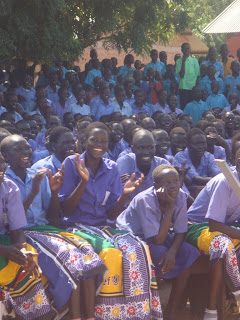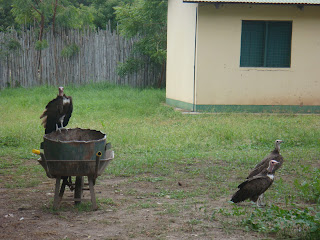So, I’ve finally found my crew. The Rumbek expat crowd are a
real mixed bunch: managers of two of the local hotels, African Expeditions
(Afex) and Safari Style, one a South African, the other an English Kenyan; two
Russian pilots; American policemen training the local police force; an
ex-military American and his German counterpart working (strangely enough implementing
a water & sanitation program) for the fashion-world funded Obakki
Foundation; UNMISS (UN Mission in South Sudan) guys that live in
self-sufficient, air conditioned containers on the UN World Food Program compound;
religious Americans working for church-funded NGOs (aka “The Menenites”) and
people working for NGOs such as Oxfam (me!) and IRC – Americans, an Italian
couple and 'the beautiful people' - a beautiful Scottish girl and her equally beautiful American boyfriend.
Safari style is the venue of choice for leisurely Sunday
afternoons sat by the pool. Or, more to the point, splashing around IN it. Pool
volleyball is the order of the day after we’ve tucked in to the Sunday barbeque,
which reminds me of barbies at home ... a point which I’ve made out loud in
conversation, only to have it jokingly suggested that all that was missing was
the shrimp. Stupid American-oriented tourism oriented campaigns. Tainted the
reputation of Australian barbeques forever more. Shrimp? Bah!
One thing I’m particularly enjoying, now that I’m more
familiar with the different establishments on offer, is the variety of food I
can access should I feel like a change from the catering at the Oxfam guesthouse.
While our cooks Mary and Margaret do a very good job of feeding us, the
rotating menu of posho (or ugali, a bread-dough-like, carb-loaded food not
unlike mashed potato... but with less taste), beans, rice, sukumawiki (cassava
greens), goat stew or the boniest chickens I’ve ever seen start to get a bit repetitive
after a while. And do they use a lot of oil... ? you bet. I’ve been avoiding
the meat dishes, if not to save my heart, then to save my taste buds.
There are a number of Ethiopian restaurants in town, which
are good to eat at. I really like Ethiopian food, particularly the big, round,
almost fizzy flat bread that forms the base of all their dishes, be it meat,
vegetables, lentils. South Sudanese food also features a similar bread, ‘kisra,’
which is just as good, but slightly different, and is served as an
accompaniment rather than underneath the food, which you then mop up with your
hands.
But it’s the Western food that I enjoy a lot – because it’s
familiar, and of course delicious. One thing that Afex do very well is
wood-oven-fired pizza. So good. They even say its the best pizza in South Sudan
– and I can’t disagree; it’s the best I’ve come across. We regularly hit up
Afex for their pizza during the week; and while you don’t always get what you’ve
ordered, by the time it arrives you don’t really care. It’s got CHEESE on it!
But what I enjoy most of all is the company. I do love our
staff at Oxfam, and really enjoy their company. They’re also a mixed bunch,
from South Sudan, Uganda and Zimbabwe, and our Program Manager is an Ethiopian;
so it’s not like I’m the only foreigner. And they certainly know how to put on
a good barbeque (nyama choma – yum!) and turn the Oxfam compound into a raging
disco on a Saturday night. But the food I would normally eat and the activities
I would normally do are still quite different to what these guys like. Plus I
see the Oxfam staff all day every day; I live and work with them 24/7.
There’s also my local buddies, Dak and Dier, two guys that I
hang out with, one of whom shares a love of basketball with me. I regularly meet them in Freedom Square at the basketball court and watch
the game, or go to a local bar, have a drink (normally soda, these guys
don’t drink beer!) and talk shop. Early in the morning we sometimes go and shoot some
hoops in the square too – before anyone else takes over the court!
I really
enjoy hanging out with them, to learn what it means to be a young person in
Rumbek, to find out what they want to do with their lives. They are cousins,
one of whom left Sudan during the war (he lived in Egypt and Nairobi for a
while), the other who has never left Rumbek. Dak has never been educated beyond
school, but hopes his brother, who lives in Canada and is married to Canadian,
will help him to pay for training to become a pilot; Dier is more studious and
is currently studying to complete his entry level exams to get into University.
They are both very different, and I really like them both. But what I find
difficult about hanging with them is that their idea of ‘doing things’ together
usually involves just hanging out – they don’t have the cash to go and do
something that costs money, and its too hot in the middle of the day for them
(or me for that matter) to go on a day-long excursion, so late afternoon/evening
is when I see them most – but security issues mean this is also limited. I’ve
only just managed to become familiar enough with how things work, plus build up
the courage, to request if they can come into the compound. They aren’t allowed
to come and hang out in the staff social area, and I think my colleagues would
find it weird anyway, so we just have to hang out in my office or at the front
of the compound. Or I break curfew and go and hang out with them at the local
pub. It’s really frustrating.
So while I love hanging out with the other expats, it’s not
because they’re white; it’s because they’re ‘my people’. They understand the
need to escape the everyday grind and do ‘normal’ things.
So we get together for movie nights; cook up pancakes (after
a debate about golden syrup vs maple syrup); hold bake-offs in the Safari Style
kitchen (based on debates about definitions of cookies vs biscuits – my Anzac biscuits
were clearly the best); go on picnics on the outskirts of town; have spur-of-the-moment
night swims in the Safari Pool, or day swims in the Hillview Hotel pool; and of
course, drink loads of alcohol together. The Russians even managed to get a
carton of Fosters from Juba. Now that really impressed me! Drinking can really
help you to relax on a Friday (Tuesday, Wednesday, Thursday...) night.
The other thing that’s really helped is that by knowing these guys, I suddenly have access to transport, and generous people who are more than willing to help out in that department. We currently are short of drivers, and with our security restrictions (no walking outside the compound after 7pm, only car travel, and we must be back by 11pm), plus the long distances between different locations in town, it certainly helps to have people who can drop you home or take you on picnics.
Hanging out with these guys makes my time in Rumbek so much
fun. It’s really made a difference to being here – I’m really starting to enjoy
it, and always look forward to weekends. Plus I’ve made some good friends to boot. Too
bad they’re not hanging around for long; but none of us humanitarian workers
ever do.
















